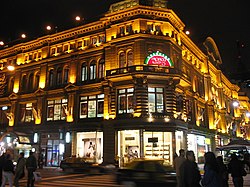Galerías Pacífico
 View of the facade. | |
 | |
| Location | Buenos Aires, Argentina |
|---|---|
| Address | Florida St. and Córdoba Avenue |
| Opening date | 18 May 1992 [1] |
| Architect | Juan C. López & Assoc. [2] |
| No. of stores and services | 150 [3] |
| Total retail floor area | 11,200 m2 [3] |
| No. of floors | 3 |
| Website | galeriaspacifico.com.ar |
Galerías Pacífico is a shopping centre in Buenos Aires, Argentina, located at the intersection of Florida Street and Córdoba Avenue.
Overview



The Beaux Arts building was designed by the architects Emilio Agrelo and Roland Le Vacher in 1889 to accommodate a shop called the Argentine Bon Marché, modelled on the Le Bon Marché in Paris.
In 1896 part of the building was transformed into the first home for the Museo Nacional de Bellas Artes and in 1908 the British-owned Buenos Aires and Pacific railway company acquired part of the building for offices. The company's name derived from the fact that its intention was to operate a train service linking Buenos Aires and Valparaíso in Chile, thereby giving access to the Pacific Ocean. From that time onwards the building became known as Edificio Pacífico.
In 1945 the building was remodelled by architects José Aslan and Héctor Ezcurra, and the offices were separated from the rest of the building. A large central cupola was constructed and decorated with 12 frescos by artists Lino Enea Spilimbergo, Antonio Berni, Juan Carlos Castagnino, Manuel Colmeiro and Demetrio Urruchúa. These frescos, executed in 1946, are some of the most important in Buenos Aires.
In The Shock Doctrine, Naomi Klein describes how the building was used as a torture center by the military junta that ruled Argentina from 1976 through 1983:
In 1987, a film crew was shooting in the basement of the Galerias Pacifico, one of Buenos Aires’ plushest downtown malls, and to their horror they stumbled on an abandoned torture center. It turned out that during the dictatorship, the First Army Corp hid some of its disappeared in the bowels of the mall; the dungeon walls still bore the desperate markings made by its long-dead prisoners: names, dates, pleas for help.[4]
In 1989 it was declared a national historic monument.
After having been abandoned for years, the building was renovated by Juan Carlos López and Associates and re-opened in 1991 as the shopping arcade Galerías Pacífico. Four more frescos by Romulo Maccio, Josefina Robirosa, Guillermo Roux and Carlos Alonso were added to the cupola. In addition to the shopping arcade the building also contains the Jorge Luis Borges Cultural Centre and the Julio Bocca Dance Studio.
Currently the mall houses many high-end stores, such as Polo Ralph Lauren, Christian Lacroix, Christian Dior, Lacoste, Tommy Hilfiger, Hugo Boss, and La Martina, among others.
See also
References
- ^ Historia del shopping
- ^ Galerías Pacífico (the book)
- ^ a b Overview at official website
- ^ Klein, Naomi: Shock Doctrine, The; 2007; 558 pages; Penguin Group; London.
